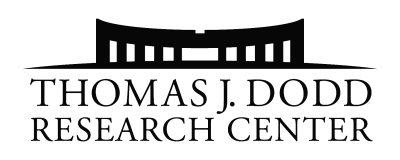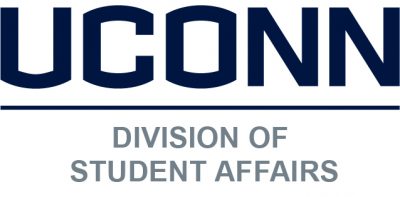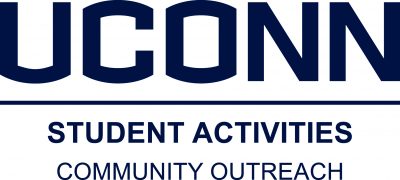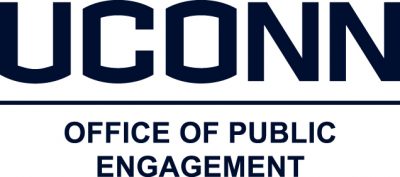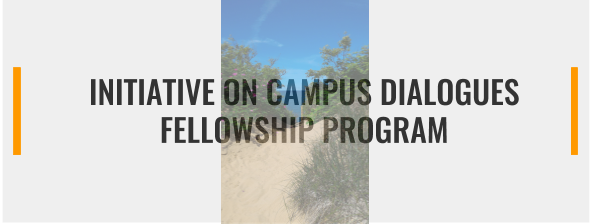
Call for proposals
The Humility and Conviction in Public Life project, in partnership with a wide range of University co-sponsors (list below), will award two (2) new fellowships to participate in its ongoing Initiative on Campus Dialogues Fellowship Program. (The 2 teams will join four (4) other teams, either “alumni” teams continuing from last year’s cohort or sponsored by a separate university unit and thus lying outside this CFP competition.)
What? The ICD Fellowship Program, now it its second year, is a University-wide partnership, with participation from academic, service, outreach and administrative units. Fellowship teams will engage in a year-long, shared-learning process in which they develop their own projects for applying dialogue and deliberation to a specific public problem or issue making use of, and potentially contributing to, current research-in-practice. The general structure for the fellowship is as follows, although more details will be supplied in response to the needs of participating teams:
- Convening meeting early in the fall semester.
- Regular meetings (3 per semester):
- Meetings will take various forms in order to meet fellows’ needs and interests. Possible examples include workshops on developing individual projects, hosting outside experts, training sessions (e.g. facilitation/moderation, digital humanities, or other tech skills), information gathering related to projected project outcomes, presentation/testing of program, etc. These meetings will be open to the entire University community and publicized by the Humanities Institute (UCHI);
- Meetings will be convened at UCHI, under the aegis of the Humility and Conviction in Public Life project, and organized by the Steering Committee of ICD.
- NB: Meeting dates will be determined once fellows have been chosen. At least one team member must be present at each meeting. All members are require to attend the Winter Break Retreat. Please bear this in mind when applying.
- Winter-break “retreat” for fellows (2 days).
- Concluding meeting/conference at end of spring semester at which fellows will present on their work and its results.
- At some point in the year, the fellows will host/hold their project event (see below). This need not be at the end of the year; the event may be held in the fall and the remaining fellowship period used to assess, gauge success, and retool and remodel in collaboration with other participants.
- For a list of last year’s Fellowship projects, see here.
Who? Projects can be led by a single individual or be team-based. Projects must be led by a UConn affiliate, such as faculty (permanent or part time), staff or students; teams can also include non-UConn affiliates. It is anticipated that two (2) new projects will be chosen
Outcomes / Outputs: The primary goal of the Fellowship Program is to develop applied dialogue and deliberation skills, informed by humanities-based approaches, and directed at problems of community concern. A secondary goal is to create a community of practice at UConn committed to the advancement of practical and theoretical knowledge of these approaches, and the general capacity of UConn to serve as a resource for those both on and off campus to address problems through democratic encounters.
The following is a list of sample deliverables that offer possible means by which that general goal might be realized by fellows/fellowship teams:
- “event” (broadly construed) by which fellows seek to address and ameliorate some problem, question or need of public importance;
- “how-to” guide, set of resources, network or infrastructure creation, etc. that will help ensure that the lessons learned and successes realized are not “one-off” but rather can continue to grow and to be built upon by others;
- publicity coverage highlighting the work, the team and its partners, and suggesting means for replicability and scalability;
- evidence of the chosen problem being solved, at least in some partial though demonstrable way, and/or description of more general cultural change realized on account of the project.
- NB. In selecting projects, preference will be given to those that forge new, innovative partnerships across the University over those requesting support for ongoing, departmental- or discipline-specific activities.
Resources provided?
- $5,000 per team:
- Funds can be used for a variety of purposes: travel, honoraria, catering, materials, consulting fees, and the like. A budget will be requested from all fellows and will be subject to ICD Steering Committee approval.
- It is hoped that participants will seek to leverage that initial support to secure additional funds, if needed.
- Fellows can also self-fund, or make arrangements with a sponsoring unit in the University.
- Materials support:
- Fellows will have access to office materials and basic equipment (copier, printer, hi-tech seminar room) at UCHI. Access is provided by requests made to UCHI office assistants
- Publicity assistance and promotion. (Please note, a minimum of 2 weeks is needed for any publicity request.)
How to Apply:
Applications are due September 7 and should be submitted in either pdf or Word format to pdp@uconn.edu with “ICD Fellowship Application” in the subject line of the email. The application consists of three parts:
- A proposal narrative (1,000 words maximum); The narrative should include the following information:
- The goals of the project;
- How these goals address those of ICD;
- How the goals will be pursued;
- The expected outputs or deliverables;
- Applicant(s)’ experience in engaged research initiatives;
- Itemized budget;
- Project timeline.
- A CV or resumé (for each participating member if team application).
Decisions will be announced Sept 14.
Sponsoring Partners:
- Humility and Conviction in Public Life
- Humanities Institute
- Department of Student Activities, Community Outreach Programs, Services, and Initiatives
- Office of Public Engagement
- UConn Extension, School of Agriculture, Health and Natural Resources
- Division of Student Affairs
- Thomas J. Dodd Research Center
- Dean’s Office, College of Liberal Arts and Sciences
- UConn Human Rights Institute
